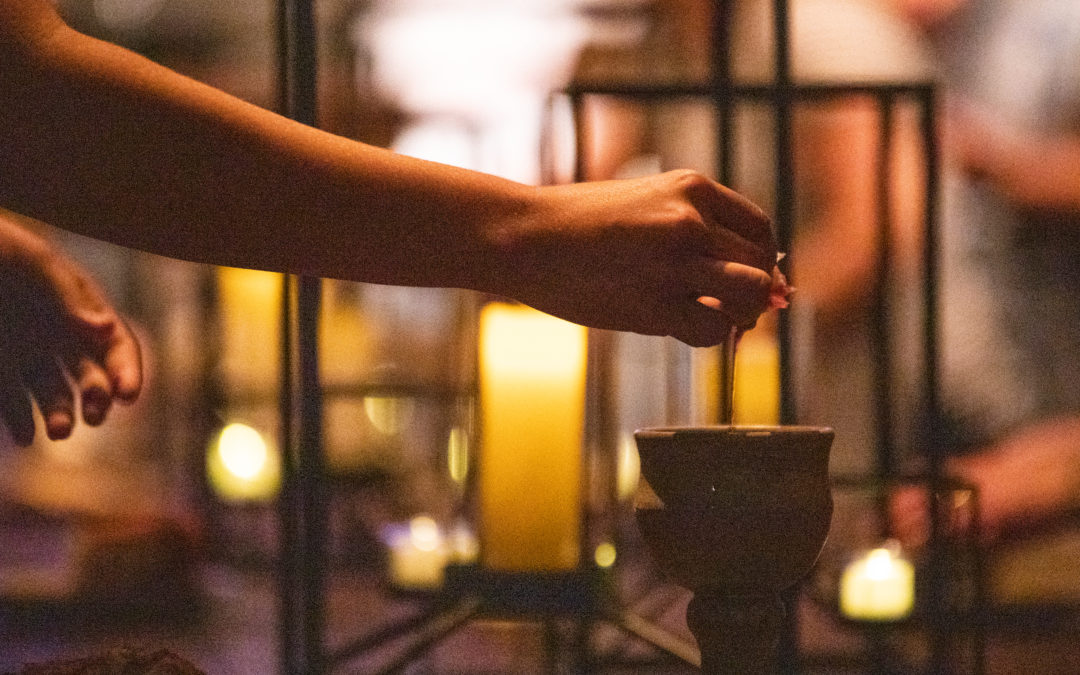by Joseph Wimer
“Do this in remembrance of me.”
Six words. That’s all I need for most of you to know that to which I am referring: Communion, The Lord’s Supper, Eucharist. Whatever tradition you come from, or whatever you choose to call it, this phrase has a unique place in the church and its worship.
In preparation for the launch of our Thursday night service, I’ve been reflecting a lot on the significance of remembering and consuming. One of the intentional choices we made for this worship service was to feature the Lord’s Table each week. But, why? Is this just the trendy thing to do, or is the celebration of this Eucharistic feast actually vital to the worship and formation of God’s people? If the answer is the latter, then how do we understand and live into this reality? How do we remember well?
Far more than the factual recollection of an event or fact, remembrance, in its purest form, is a very visceral and bodily experience. We see this very clearly with traumatic experiences and how they influence our behavior. When something happens in the present that reminds us of a harmful event in our past, we remember that experience with our bodies. Our pulse quickens, anxiety surges in our chest, our stomachs turn, and we sometimes feel frozen. We do not just acknowledge the fact that something bad happened, but we experience it all over again – there is a familiarity to it. In the same way, when we remember vibrant and beautiful memories, we experience the same sensations we did in that time. When I remember my wedding day, I experience again the nerves of anticipation, the fluttering of my stomach when I laid eyes on my bride, and the swelling sensation in my chest as I saw laughter and joy on the faces of friends and family. I can smell the damp grass from the rain that morning, as well as the slight odor of hay and livestock (we got married on a farm). More often than not, to remember is to relive.
Imagine then, the weight of this command to those first disciples. They lived through the experience of Jesus’ night of anguish; they saw him carried off to be tried and punished; they would have witnessed his bloodied and mangled figure stumbling through the streets of Jerusalem and heard the mocks and jeers from the crowd; they would have looked upon his lifeless body hanging from a tree. For them, to celebrate the Eucharist was to do so with these memories and images stored within their hearts. For them to remember was not mere symbolism or metaphor. Their remembrance was a reliving. Should it not be so for us?
“Take and eat.”
Let Though we were obviously not present for these events, and do not have the experiences and images stored in our psyche, it remains that we belong to a people who are called and commanded to remember. I think the key contained within this word is “member.” To be a member is to be a participant. To be a member is to be a part of something that is much bigger than you. To be a member is to belong to something and, more importantly, to someone. In a mystery that we will never adequately explain, we are joined to the risen Christ, and to his Church, through the power of the Holy Spirit. When we take into ourselves the body and the blood of the crucified Jesus, we have communion with him, and not only with him, but with all those who have received his salvation and declared it over and over again through the table of “communion” – past, present and future.
Jesus’ invitation to “take and eat” is no small matter. I am increasingly convinced that the more we consume something, the more we gain an appetite for that thing. I might say it another way – what you consume shapes what you desire. In an age where we are bombarded with choice, where the bottom line is what drives our world, and where information and commodities are at our fingertips, we are taught that it is our duty to consume. So we do it with hardly a second thought. We are voracious and without discernment. We consume whatever we can: food, media, relationships, cultures, earth’s limited resources… It’s our duty, after all. And yet, at the end of each day, we find that we are unsatisfied, lonely, and still longing for more. We have squeezed every last drop out of experiences and relationships, and they still have not touched our deepest desire. In this emptiness, we hear the voice of Jesus… “Take and eat.”
Friends, I believe we meet Jesus in a unique way at the communion table as we communally respond to his invitation to feast on him. He knows that he is the only one who will satisfy our soul’s hunger pangs, so he has given us himself as the meal of true life. He has given us physical elements to take into ourselves, that we may be reminded when we inevitably forget. I say “we” because we do not remember in isolation. Left to my own devices, I too easily forget the Story to which I belong and the Savior to whom I belong. Just as I need to be re-membered to Christ, so I need to be re-membered to his Church. My prayer is that as we gather at the Lord’s Table on Thursday nights, our consuming of him will deepen our desire for him. My hope is that when we eat of the bread and drink of the cup, we will rejoice more fully that we belong to each other and to him.
Let us taste and see that he is good.

